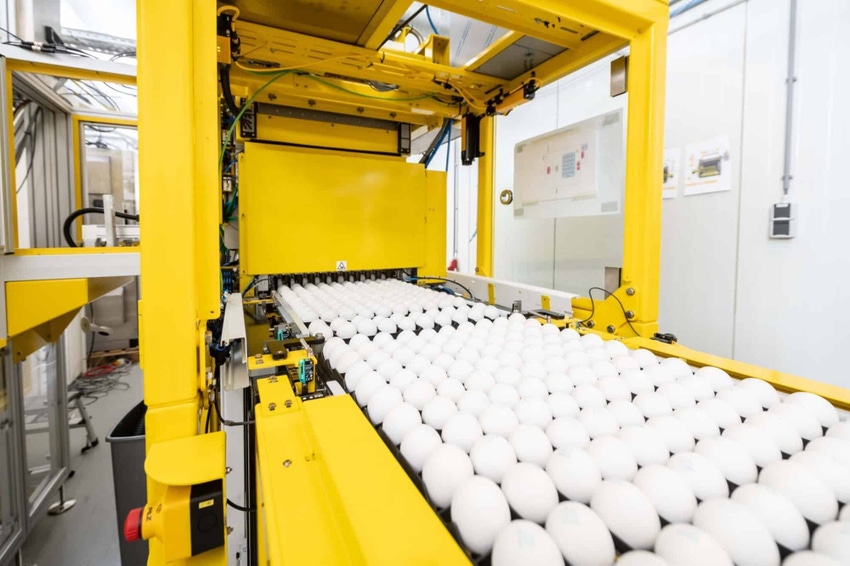Phase II Egg-Tech Prize finalists announced
Final stage of $6 million program to develop technologies for early-stage sex determination of layer chicks while still in the egg.
December 12, 2023

The Foundation for Food & Agriculture Research and Open Philanthropy have announced the Phase II finalists of the Egg-Tech Prize, a research competition to accurately and rapidly determine a chick’s sex before it hatches to avoid the layer-industry practice of culling of day-old male chicks.
"This prize is on the cusp of profoundly revolutionizing global egg production. The success of one of these technologies will boost profitability, improve animal welfare and increase the sustainability of our egg supply chains," said Jasmine Bruno, scientific program director, Advanced Animal Systems.
Only female chicks are used for egg production, since male chicks cannot lay eggs. Males from egg-laying breeds are unsuitable to raise commercially for consumption. Thus, male chicks are culled soon after hatching, a process known as male chick culling. The practice presents ethical and animal welfare concerns, creates additional costs for producers and wastes resources. Currently, in the United States and certain other parts of the world, chicks can only be sexed after they hatch, which requires producers to devote time and resources to incubating the male eggs, only to cull them.
However, if technology existed that could determine a chick’s sex before it hatches, the egg industry could eliminate male chick culling, save money currently spent incubating eggs with male chicks and divert the unhatched eggs for use in vaccine production or food production.
"I’ve been extremely impressed with the rapid progress of innovation in this competition, and with the quality of the three finalists’ technology. We’re already seeing the adoption of in-ovo sexing technology in Europe, and I’m optimistic that these finalists’ innovations will enable the U.S. egg industry to soon follow suit," said Lewis Bollard, Open Philanthropy's program officer for farm animal welfare.
Phase II of the Egg-Tech Prize is the final stage of a $6 million program to develop technologies for accurate, high-speed and early-stage sex determination of layer chicks while still in the egg. Three finalists are receiving funding in Phase II to advance their research over 12 months, after which the Egg-Tech Steering Committee will evaluate their progress to determine the Phase II Prize winner, who will receive the remaining prize investment. FFAR contributed a total of $745,138 to the three Phase II finalists, which Open Philanthropy matched for a total award of $1,490,276. The Egg-Tech Prize is also supported by $100,000 from USPOULTRY.
The Phase II Egg-Tech Prize finalists are:
Leonard van Bommel, systems engineer at In Ovo, received $495,990 to further develop and scale its pioneering in-ovo sexing technology called Ella. Ella measures a naturally occurring biomarker in the embryo’s allantoic fluid, or “waste bag” in the egg. The concentration of this biomarker differs between the sexes, allowing Ella to sort the eggs with high accuracy by sex on the ninth day of development. The additional Egg-Tech Prize funds allow In Ovo to increase Ella’s accuracy, capacity and ability to sort eggs earlier.
Carla van der Pol, research manager at HatchTech Group, received $499,331 to use hyperspectral imaging and Raman spectroscopy to develop a commercially applicable optical technique for sexing hatching egg. Van der Pol’s team (including experts from Wageningen University and Research, Adaptation Physiology Group) is using their existing fluid uptake machinery called the Circuit to extract small droplets of the embryos’ allantoic fluid from the egg. In this project, spectral technologies will be developed to analyze this fluid at the eighth day of incubation. The light’s wavelength patterns reveal whether the embryo is male or female.
Thomas Turpen, founder and chief executive officer of SensIT Ventures, Inc. and the only Phase II Prize finalist who was also a Phase I finalist, received $494,956 to continue development of SensIT’s innovative microchip-based chemical sensor that captures volatile organic compounds released from individual eggs as early as eight days into incubation. Machine learning can interpret the VOCs to classify eggs by gender. This additional prize funding is supporting the integration of the microchip sensors with a custom automated egg handling machine that sorts the sexed eggs using an inexpensive, non-invasive, automated, high-throughput method. The researchers also propose testing this technology at commercial hatcheries.
More details about this research are available on the FFAR website.
You May Also Like



